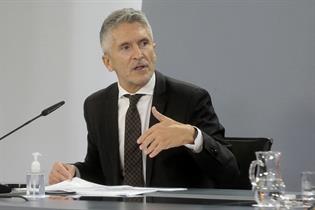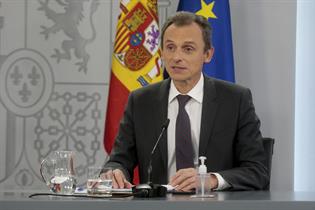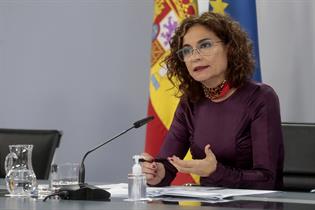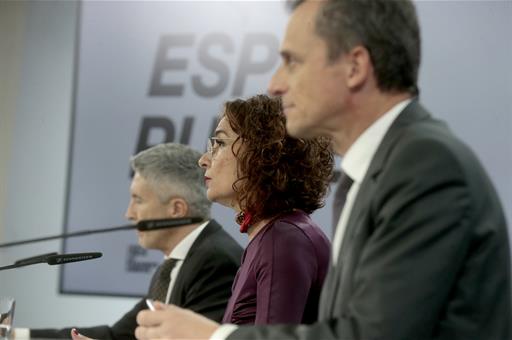Council of Ministers
Government pushes through new road safety model to reduce traffic accidents
Council of Ministers - 2020.11.10
Moncloa Palace, Madrid
The Minister for Home Affairs, Fernando Grande-Marlaska, explained that the Council of Ministers amended the legislation with the aim of reducing traffic accidents, lowering the number of deaths and serious injuries in traffic accidents over the next 10 years and moving towards a figure close to zero by the year 2050.
Traffic and Road Safety
The government analysed the draft bill to reform the Recast Text of the Traffic, Motor Vehicle and Road Safety Act as regards points-related driving licences. On the one hand, it increased the number of points to be dedicated from three to six for driving while holding a mobile phone, and on the other hand, it increased from three to four points to be deducted for not using seat belts, child restraint systems, helmets and other protective gear.
Furthermore, the new legislation classifies employing radar detection systems in the vehicle as a serious infringement, which could result in a fine of 500 euros and the loss of three points. Cars and motorbikes may not exceed by more than 20 kilometres per hour the speed limits on conventional highways when overtaking another vehicle.
The text introduces the possibility of recovering two points on the licence by taking a safe driving course certified by the Directorate-General for Traffic (Spanish acronym: DGT).
Fernando Grande-Marlaska stated that since the introduction of the points-related licence in 2006, traffic accident rates have fallen by 57.2%, and that almost 1% of drivers have lost their licence after running out of points.
Urban mobility
 Foto: Pool Moncloa/JM CuadradoThe Minister for Home Affairs also reported on the approval of a Royal Decree that amends both the General Traffic Regulation and the General Vehicle Regulation. In his opinion, it is necessary to regulate urban traffic in those cities where the number of deaths rose by between 6% and 7% last year.
Foto: Pool Moncloa/JM CuadradoThe Minister for Home Affairs also reported on the approval of a Royal Decree that amends both the General Traffic Regulation and the General Vehicle Regulation. In his opinion, it is necessary to regulate urban traffic in those cities where the number of deaths rose by between 6% and 7% last year.
The new legislation establishes that on those roads that only have a single carriageway and pavement (with no height differentiation), the speed limit will be 20 kilometres per hour. On those roads that only have a single carriageway for each direction of vehicles, the speed limit will be 20 kilometres per hour and on those carriageways with two or more lanes per direction of vehicles, the speed limit will continue to be 50 kilometres per hour.
The minister underlined that lowering speeds from 50 to 30 kilometres per hour reduces the risk of death from being run over by five times while it does not slow down urban traffic.
These limits will come into force six months after their publication in the Official State Gazette so that citizens and local authorities have sufficient time to adapt road signs.
Personal mobility
The Royal Decree defines personal mobility vehicles as those with one or more wheels, with a single space and exclusively propelled by electric motors with a maximum speed of between 6 and 25 kilometres per hour, such as electric scooters.
Fernando Grande- Marlaska announced that the General Traffic Regulation will apply to them as to other vehicles, and hence it will be prohibited to ride them on pavements and in pedestrian areas, as well as on intercity roads, crossings, urban motorways and urban tunnels. Furthermore, this type of vehicle may only be used with the corresponding traffic certificate that accredits that it complies with certain technical requirements.
Access to a driving licence
The government has reformed the General Driving Regulation with the aim of reducing the legal age required to drive trucks and buses without passengers to 18 years of age, provided the driver has passed the Certificate of Professional Aptitude. It also provides for the possibility, following a medical evaluation, of people with problems associated with the locomotor system being able to drive these vehicles.
The minister stated that by adopting these measures, "this improves access by young people to the labour market in the road transport sector, where there is a lack of professional drivers".
Fernando Grande-Marlaska also announced that the DGT will draw up an auxiliary road vehicle regulation, and reform the Driving Regulation to protect the most vulnerable users: pedestrians, cyclists and motorcyclists, who suffer more deaths in road accidents than drivers of four-wheeled vehicles.
412 million euros for R&D+i projects
 Foto: Pool Moncloa/JM CuadradoThe Council of Ministers authorised the main annual round of proposals for Research, Development and Innovation Projects (R&D+i) to be financed by the State Research Agency with an allocation of 412 million euros, up 50 million on the figure for 2019.
Foto: Pool Moncloa/JM CuadradoThe Council of Ministers authorised the main annual round of proposals for Research, Development and Innovation Projects (R&D+i) to be financed by the State Research Agency with an allocation of 412 million euros, up 50 million on the figure for 2019.
The Minister for Science and Innovation, Pedro Duque, highlighted that 3,000 research groups exist, that are potential beneficiaries, in universities, public research bodies, hospitals, technology centres and other agents in the science and innovation system in Spain, whose work he publicly acknowledged.
"Now is the time to commit to science and the government understands this clearly", claimed Pedro Duque, who recalled that the Action Plan for Science and Innovation offers a raft of direct investments for the sum of 1.06 billion euros for 2020 and 2021, and that the Draft National Budget for 2021 also provides for an increase of almost 60% in direct investments in science and innovation, to 3.23 billion euros.
Vaccines against COVID-19
Pedro Duque stressed that research and the generation of knowledge are essential in the fight against COVID-19, and highlighted that numerous projects are being carried out in Spain, for example the seroprevalence project that has just begun phase four, and others on diagnoses, genetic risk factors and immunology. The minister also underlined the role "and efforts" made by Spanish industry, which is enhancing its transformation and adaptation to manufacture the necessary products.
The minister described the news that the companies Pfizer and BioNTech, in the vaccine they are developing, have achieved 90% effectiveness in the prevention of the coronavirus in clinical trials as "encouraging", while defending the validity and continuity of the dozen Spanish projects aimed at also discovering a vaccine, because they involve "different technologies to those that are being commercially developed". It is "likely" that their clinical trials can begin as from January next year.
For her part, the Minister for the Treasury and Government Spokesperson, María Jesús Montero, announced that if the Pfizer-BioNTech vaccine passes all the controls, the forecast is that Spain will receive 20 million doses to vaccinate 10 million people. It will be administered will be free of charge and priority will be given to those groups of people that are jointly determined by the Ministry of Health, the regional governments and scientific societies.
Other agreements
- Royal Decree on the terms and conditions and round of proposals for subsidies for the sum of 3 million euros for fishermen affected by contract suspension procedures or the reduction in their working day as a result of COVID-19.
- Royal Decree regulating the procedure for the selection of Spanish candidates for judges and advocates general of the Court of Justice of the European Union (EU), the European General Court, judges of the European Court of Human Rights and ad hoc judges of this court.
- Submission to Parliament of the revised European Social Charter - a Council of Europe treaty that guarantees fundamental social and economic rights.
Current affairs
 Foto: Pool Moncloa/JM CuadradoThe Government Spokesperson reiterated, on behalf of the government, the congratulations that the President of the Government Pedro Sánchez had already conveyed to Joe Biden on his victory in the presidential elections in the United States on 3 November, and expressed her trust that this new era will contribute to enhancing collaboration between the United States and the European Union, "particularly on such matters as our trade relations and in the fight against climate change".
Foto: Pool Moncloa/JM CuadradoThe Government Spokesperson reiterated, on behalf of the government, the congratulations that the President of the Government Pedro Sánchez had already conveyed to Joe Biden on his victory in the presidential elections in the United States on 3 November, and expressed her trust that this new era will contribute to enhancing collaboration between the United States and the European Union, "particularly on such matters as our trade relations and in the fight against climate change".
As regards the debate on the full amendments to the Draft National Budget for 2021, which will be held on Wednesday in the Lower House of Parliament, María Jesús Montero called for the parliamentary groups to place the needs of the country at the top of the agenda because "Spain needs a new Budget to exit the crisis as soon as possible":
Lastly, Pedro Duque announced that the optical observation satellite Seosat-Ingenio will be launched on Monday, 16 November from French Guyana - the first one owned by the Government of Spain, which will allow data to be strategically used for very diverse purposes, from security to agricultural and environmental management.
Non official translation





